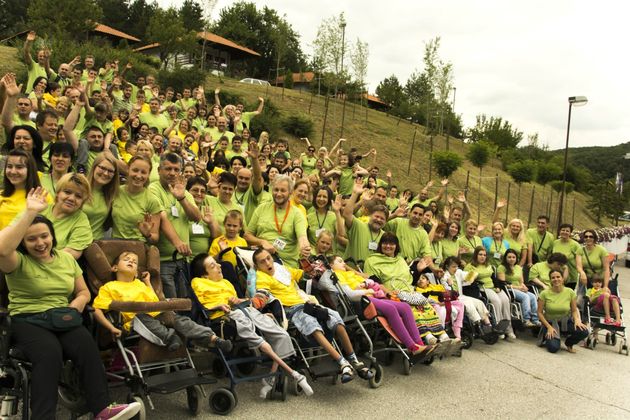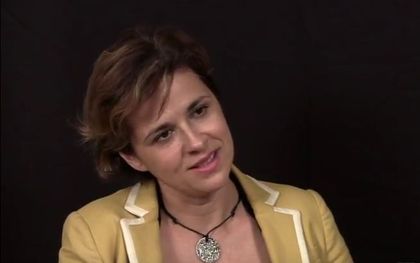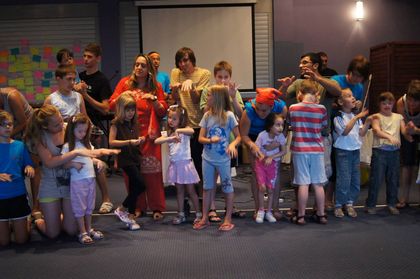“God uses kids who do not speak to speak His Good News”
Jelena Sivulka, counsellor and founder of Hanina nada, talks about finding hope in Christ when dealing with disabilities. “God loves us for who we are. I share that with families of kids with special needs”, she says.
WISLA (POLAND) · 28 MAY 2019 · 12:35 CET

How are churches dealing with people with disabilities? Are we Christians aware of their needs?
Jelena Sivulka is a counsellor and the founder, along with her husband, of Hanina nada, a Christian organisation that works with children with special needs and their families.
When their daughter Hna was diagnosed with severe autism, they “found hope in Jesus, and we started sharing that with other families”, Sivulka told Evangelical Focus in an interview during the 2019 European leadership Forum in Wisla, Poland.
She explained how they “realized that kids like Hana are not really welcomed in church, which does not make sense when you read in Luke 14 how to bring to the table the poor and the crippled. Where are they in our churches?”.
“God actually has tons of kids with disabilities. Despite all of ours issues, He gave His Son to become nothing to pay for us, to ransom us, to give us hope, to incorporate us in His family, because we are failing humans”, Sivulka added.
“The biggest miracle is how God uses kids who do not speak, to speak His Good News”, she concluded.

Q. What is Hanina Nada (Hana’s Hope)?
A. Hanina Nada means Hana’s hope. Hana is our daughter, she is 14 years old with severe autism.
My husband and I are living in United States, we are church planters. I am a counsellor. But then our lives kind of shifted when Hana was born and diagnosed with autism.
Very quickly after that, we found hope, not in psychotherapy, but in Jesus, and we started sharing that with other families.
Being church planters, we were in a very young church, and it was hard to bring a child who screams. We had a hard time welcoming our own daughter into our own church.
Very quickly God put in our hearts to open the doors of our church for our daughter. We realized that kids like Hana are not really welcomed, which it does not make sense when you read in Luke 14: 'Bring to the table and go and call the poor and the crippled'. Where are they in our churches?
Q. How were the first steps to build this ministry?
A. I am Serbian and my husband is American. We were already in Serbia doing ministry, and Hana is our third child.
We thought that everything was doing fine. We loved Jesus, we spent time with Him, and, of course, we were going to have 3 healthy kids... And then autism happened and we shifted to: “God, if you heal her, we are going to write a book and You will be proclaimed”.
He did not heal her from autism, but He did heal us in so many ways, of letting go the dream of what good life is by the definition of this world.
He is still working in our hearts. There are days when it is really hard, and our home is really a battlefield, many parents of teenagers will understand that.

But it started with little things, trying to find hope. We connected with Joni And Friends ministry in the US and started to do camps, visiting families, trying to talk with them about what God taught us about Hana.
Hana has been my ongoing school, I have learnt from her. The girl that does not speak has been teaching me.
This lesson really started when, after a year or so, I opened up to God and in the blunt way I sometimes say things. I told Him: “I do not know if you can understand me, your Son could talk, you never really raised a child with autism”.
And He showed me a very interesting picture: I have two typical kids, and you usually raise those kids so that they will leave, they will become independent, they will not need you, one day when you are not there, they will be OK. But, have you noticed how our relationship with God is? Are we independent? My girl just showed me very clearly how God actually has tons of kids with disabilities.
Despite all of ours issues, He gave His Son to become nothing to pay for us, to ransom us, to give us hope, to incorporate us in His family, because we are failing humans.
It has been an amazing lesson that God taught me through Hana. Another one is that autism is horrible, but my daughter is beautifully created.
She will never come home with a diploma, she is not going to come home with a boyfriend or a grandchild, but I love her!

I am not a better parent than God is. Do we really think that He is going to love us because we are doing well in ministry? He just loves us for who we are. I love to share that with families who have kids with special needs.
There is hope, God is a good and loving God, and He is really taking good care of us, He is actually walking by you.
Just like the disciples in Emaus who did not recognise Him, very often in our pain and suffering we are blinded. So I just talk about Him to others. That is what this little girl that cannot talk did in my life.
Q. During these years of ministry, have you seen doors opened in Serbia by God in ways you did not expect?
A. When we do camps and counseling, we meet a lot of families, but we cannot function without volunteers.
One of the things that I have seen over and over again, is how young kids fell in love with Jesus because they fed a child with cerebral palsy for 5 days. Like the verses which say “you fed me when I was hungry, you gave water when I was thirsty” - people meet with Jesus through this process.
One year we decided to do the Christmas story with children with special needs. Most of them from non-Christian families. We asked the parents if they were willing to bring their children and they agreed. We had a Mary in a wheelchair, my Hana was an angel, and so on, so we needed volunteers for them.
Many kids could not speak, so there was a narration and some learnt their pat by heart, they repeated over and over the same story to their parents. This child who hardly speaks, shared the gospel with his parents.
They also learnt the songs and loved to come to church, so we invited them and the parents came too. It was great that the church step up and did it. I wish it happens more often.
I guess I am a slow learner, because the Lord had to bring this girl in my house, so that I will see and learn. I hope the others will be better learners, and that will open up the door to churches to welcome the broken and messy.
It is unbelievable that autism touches so many. In so many levels, you just meet people who would connect you with someone. We just want people to feel loved, they do not have to be part of our church.
We really want them to find joy, peace and hope in Jesus, and I think that sometimes happens.
Probably, the biggest miracle is how God uses kids who do not speak, to speak His Good News.
Published in: Evangelical Focus - life & tech - “God uses kids who do not speak to speak His Good News”
